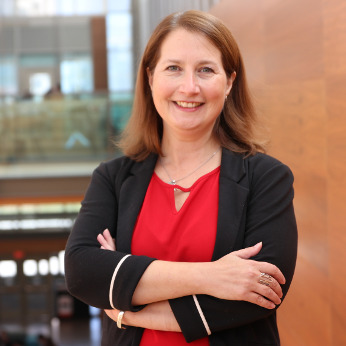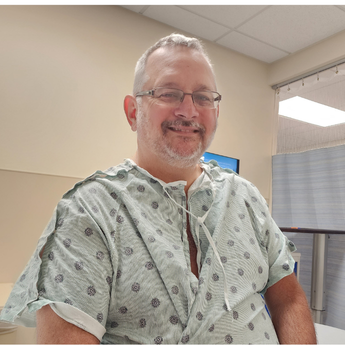 Colleen Packer of Calgary felt a wide range of emotions when she was diagnosed with metastatic lobular breast cancer in 2019: “Shock. Frustration. Fear. Grief. I sobbed. Initially in that first year, it had a really huge impact. Now it has become more routine. Now I feel a lot more in control. It’s a strange mix of feelings to have. It’s both/and. It’s possible to feel happy and sad, angry, grateful, afraid, and confident all at the same time. All those feelings are valid, and you need to provide space for all those feelings because they’re all very much a part of the experience. You can’t just shove the hard ones down and be all toxic positivity (everything is going to be okay; everything happens for a reason). All those feelings at once are part of the experience, from my perspective.
Colleen Packer of Calgary felt a wide range of emotions when she was diagnosed with metastatic lobular breast cancer in 2019: “Shock. Frustration. Fear. Grief. I sobbed. Initially in that first year, it had a really huge impact. Now it has become more routine. Now I feel a lot more in control. It’s a strange mix of feelings to have. It’s both/and. It’s possible to feel happy and sad, angry, grateful, afraid, and confident all at the same time. All those feelings are valid, and you need to provide space for all those feelings because they’re all very much a part of the experience. You can’t just shove the hard ones down and be all toxic positivity (everything is going to be okay; everything happens for a reason). All those feelings at once are part of the experience, from my perspective.
“I don’t think I went through a “Why me?” or “Why did God allow me to have cancer?”. The God I believe in doesn’t make bad things happen to good people. That’s just the world we live in. Bad luck is bad luck. It does bring me a lot of strength and a sense of comfort and peace to have a faith system.
“Work is also an important part of my identity. Being able to continue working during my diagnosis and treatment helped me keep that identity. I wasn’t just Colleen Who Has Cancer. I was still able to be Colleen, the Director of Global Learning at the University of Calgary. It gave me a sense of normalcy. It gave me a sense of meaning, a sense of purpose. Cancer has a way of taking over your identity, and so work helped reinforce that I was more than my cancer and gave me a place where I was normal. It was my cancer-free zone.
“But work isn’t who I am and it’s not the only thing I do. My perspective has changed a lot since my diagnosis. I do have a lot more work/life balance now. Before diagnosis, I let work take over a lot more of my life than it should have. Now I am much more protective of my non-work time. I put that into family and friends and wellness. Making sure that I am active and going walking and hiking in the mountains. Being more deliberate about spending time with family and friends. I don’t take that for granted anymore.”
Colleen has two pieces of advice for newly diagnosed breast cancer patients: “The first piece of advice would be to reach out for help and to find other people who are in similar circumstances. I’ve learned so much from the support groups, the Facebook groups, the other people that I’ve met and become friends with and who are going through similar things. They’re the people that really get it.
“My second piece of advice is to arm yourself with as much information as possible. Cancer has a way of taking away your control. But the more you can learn about your diagnosis, about your treatment, about benefits, about all the different ways your diagnosis is going to impact your life: knowledge is power. And so, the more knowledge you have, the better informed you will be, the better you’ll be able to make decisions.
“Ultimately you are the one who can make decisions for you. You know yourself best. You know your capacity best. As you grow in knowledge and have a better sense of what’s going on, you’re the one who is best able to make decisions about what works for you. For some people, stepping away from work is the best decision for them in that moment. For some people, continuing to work is the best decision for them in that moment. A lot of it is arming yourself with the knowledge of what the best thing is for you and then advocating for yourself and not letting other people tell you what you need to do or what’s going to be best.
“I’m the person for whom knowledge is power. I’m the person who is attending the webinars and following the cancer researchers on Twitter, especially when there are conferences going on and new findings being presented. I follow that very closely. Knowing that there is a lot of research going on and that there are new treatments and trials coming around all the time gives me hope. Knowing people in my support groups who have been stable on my treatment for longer than I have, who have been around for longer than I have, gives me hope.
“When I was diagnosed, I had no idea if I would be around twelve months from then, let alone still working and having a purpose and having a really good quality of life. And so, knowing that my life isn’t just cancer and that I have a very rich life and I’m able to do a lot of things, that also gives me hope.”






